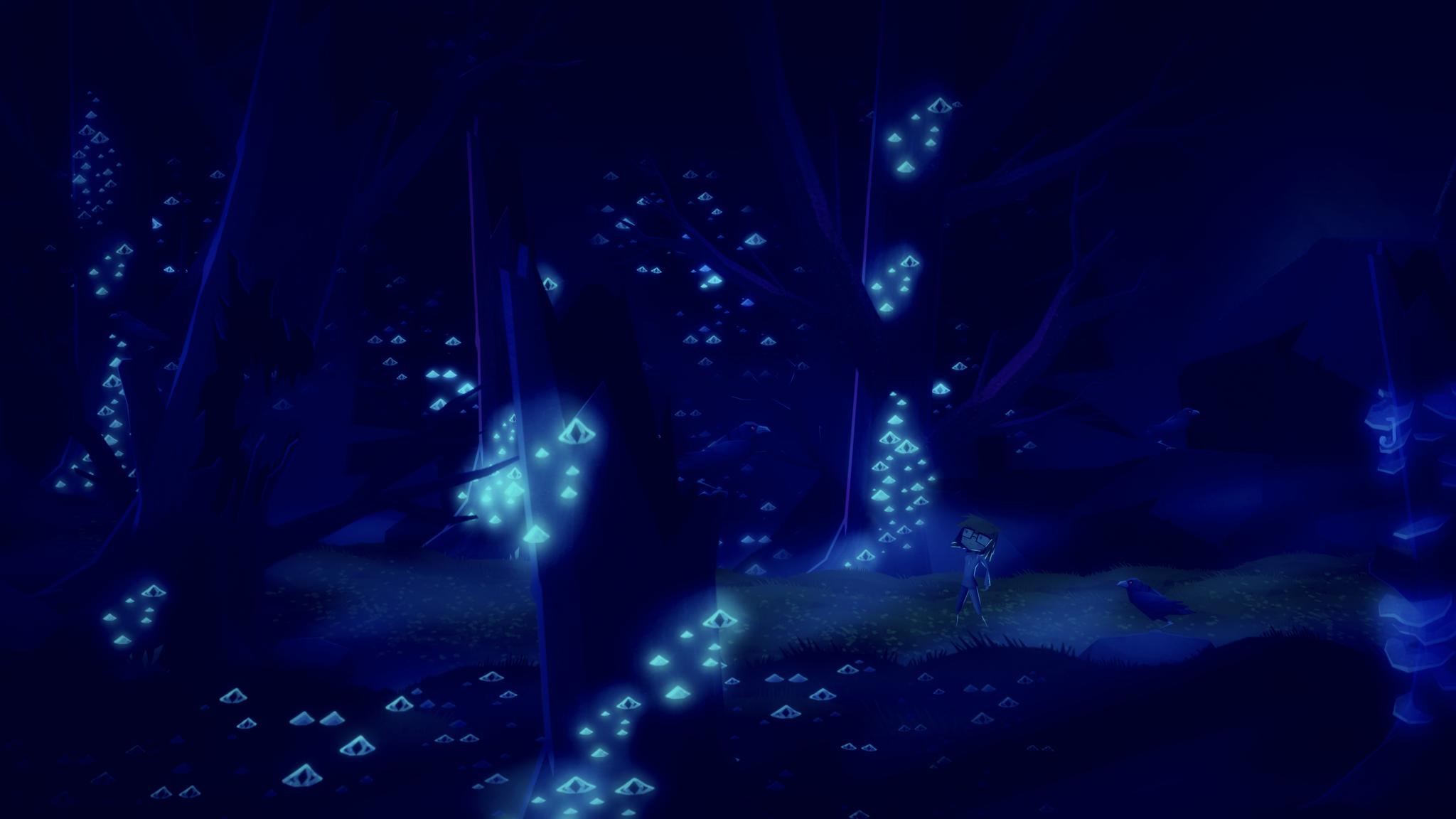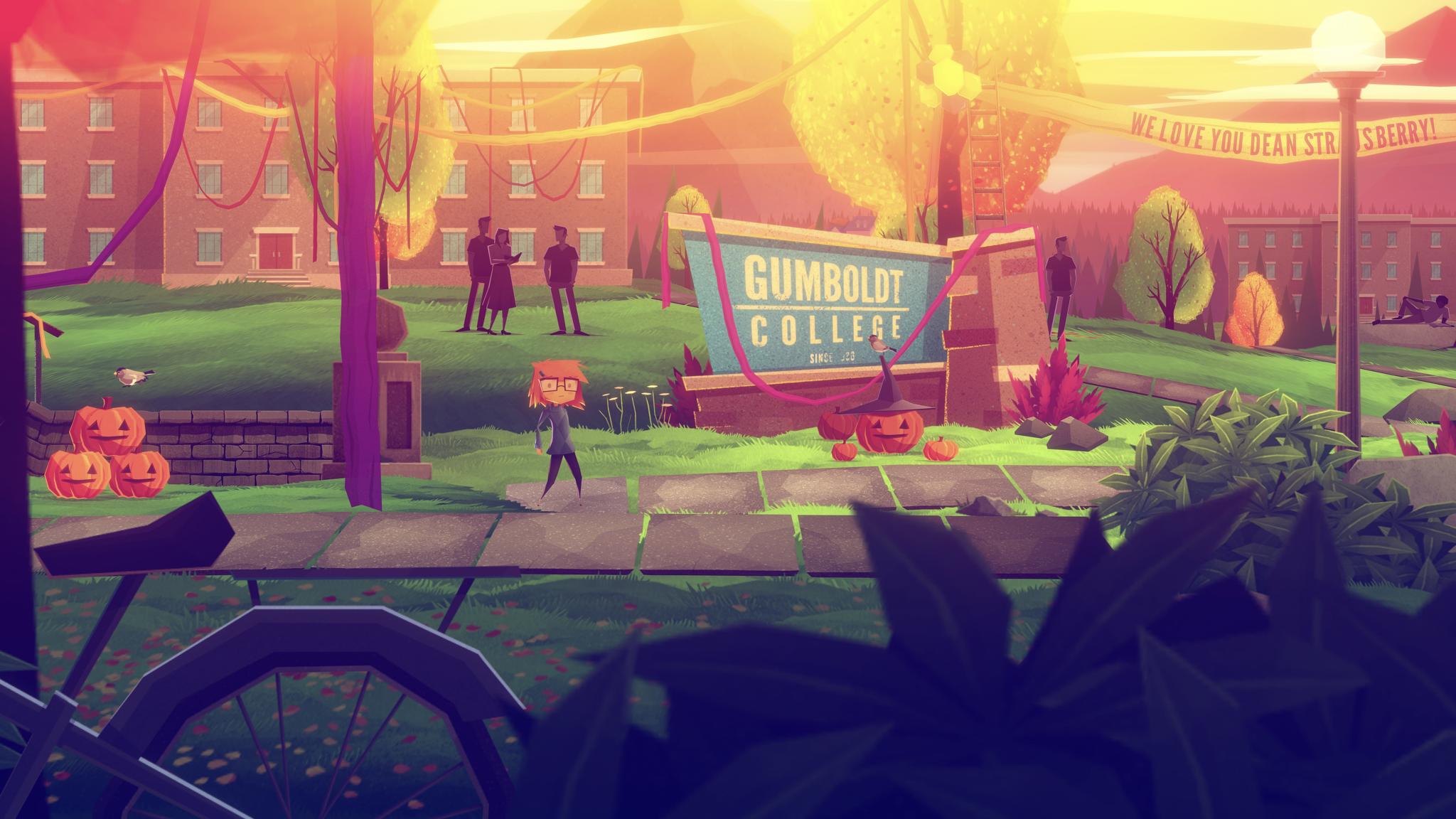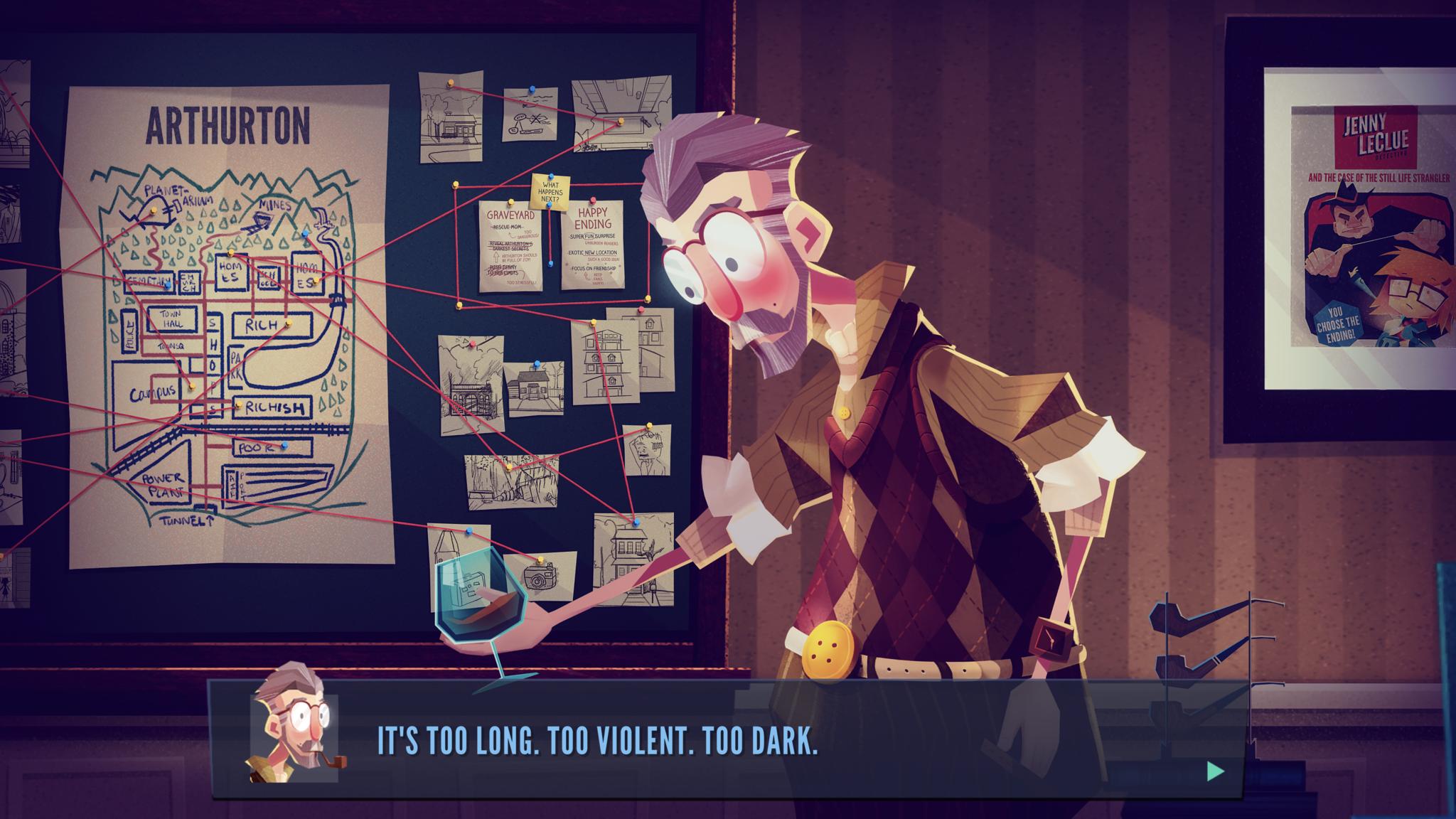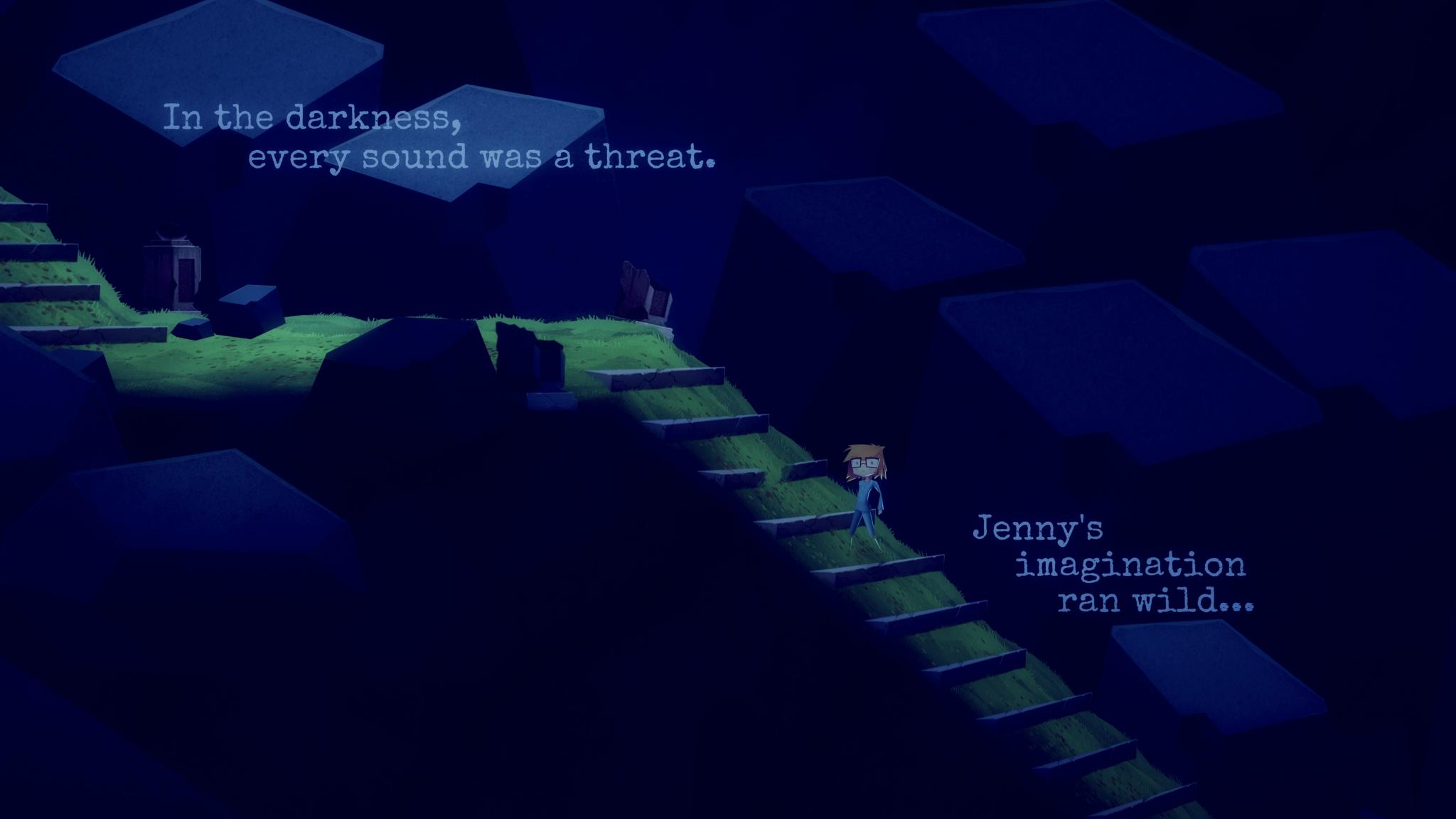Jenny LeClue: Detectivú for Apple Arcade Review: The Case of the Missing Ending


Apple Arcade enables new and different kinds of gaming experiences – but that's not always a good thing. At least a few of its titles (looking at you, Down in Bermuda and Operator 41) don't so much finish as just stop, leaving you hanging just as you're getting the hang of them. That's less infuriating than it might be since your cheap monthly fee includes a pile of other games to play, but it's still a letdown. Jenny LeClue: Detectivú, unfortunately, joins that club, with truly superb writing and beautiful visuals that ultimately smash headfirst into the brick wall of its halfhearted non-ending.

Unlimited games, one price
Apple Arcade has over a hundred premium games with more added regularly each week. There is something here for everyone, and it only costs $5 a month for all you can game!
The Peril of the Pernicious Publisher
Arthur Finkelstein has a problem. Sales for his cozy, long-running series of mysteries involving kid detective Jenny LeClue have cratered. Finkelstein's affection for his characters means Jenny and her friends in the happy little town of Arthurton never face real peril or stakes. Now his publisher's issued an ultimatum: Give Jenny a true challenge, with actual death and danger, or they'll pull the plug on her for good.

Before long, a beloved figure in Jenny's life has met a grisly, baffling end; her mom's been arrested as the chief suspect; and Jenny's on the run trying to uncover the connections between the murder, Arthurton's mysterious blackouts, a long-ago mine disaster, and the tragic death of her own father.
You'll switch back and forth between Finkelstein and Jenny as the game progresses, helping the author strike the right balance between his own impulse to keep Jenny safe, and the darker story he needs to tell to keep her series alive. This metafictional aspect adds a lot of clever wit to the game, especially when headstrong and adventurous Jenny starts to argue with her overly protective author.
The Conundrum of the Complicated Characters
I can't emphasize enough how unexpectedly great this game's writing is. The terrific plot shifts slowly from Jenny's usual peachy-keen sleuthing into truly weird, eerie, and fascinating territory. The story manages to stay family-friendly without pulling any punches, as Jenny uncovers stark tragedy both in her own life and her hometown's history. (The game draws attention to the "twin peaks" that loom over Arthurton, and includes a brain-fried conspiracy theorist who resembles a gone-to-seed Fox Mulder, in case you were wondering about its influences.)
Jenny LeClue also frequently looks amazing, with vivid colors, tons of clever background details, and heaps of ominous, autumnal atmosphere. The animation, simple but expressive, gets a big assist from clever lighting, evocative sound design, and a camera that cinematically zooms in and out to highlight details or let you drink in the scale of Jenny's beautiful surroundings.

But of all the game's virtues, its character writing shines brightest. Jenny LeClue refreshingly resembles Veronica Mars more than Nancy Drew: rude, pushy, and self-centered, using her intelligence to browbeat and bully people because she's afraid of letting anyone get too close. Without getting too heavy-handed, the game shows you how much Jenny's still hurting from her dad's death, and how her desire to somehow magically make everything better again leads her into self-delusion. Yet despite these flaws, you still like and root for Jenny; she's brave, resourceful, determined, and ultimately trying to do the right thing.
Master your iPhone in minutes
iMore offers spot-on advice and guidance from our team of experts, with decades of Apple device experience to lean on. Learn more with iMore!
The other characters don't get quite this level of depth and complexity, but they still feel fresh and appealing. When tragedy drives a wedge between Jenny and her best friend, his disappointment in her stings. And after Jenny discovers that the local rich, popular girl is more than she seems at first glance, their grudging friendship proves honestly moving and sweet.
The Clue in the Controller
Jenny LeClue's outstanding writing compensates for a lot of otherwise so-so elements in the gameplay. There's some rudimentary platforming as Jenny explores different areas, but it never feels especially fun or challenging – just a way to get from point A to point B.
At least there's plenty of variety in the things you're asked to do: find hidden stickers and scraps of postcards to assemble, decode ciphers concealed in a book of folktales, pick locks, solve one of a limited selection of puzzles that repeat throughout the game, scrutinize people and crime scenes for clues, and more.
The game also involves "choosiness," offering Jenny limited-time decisions about how she'll react to various dilemmas. These rarely affect the course of the story too much, but the game does keep track of the decisions you make and analyzes what that says about your personality — a fun little bonus.
The deduction parts of the game are entertaining, if not terribly difficult. Once you've pored over a crime scene to discover the evidence, you'll have to pick the real clues out from among the red herrings, connecting them to find a solution. The narrative stakes for these puzzles vary but feeling like a successful, shrewd sleuth when you solve a mystery never quite gets old.
Jenny LeClue works best when it's taking unexpected chances. Its cold-open prologue, for instance, sets an appropriately spine-tingling tone for everything that follows. And a playable nightmare sequence for Jenny early in the game wraps clever character development in really striking and unexpected visuals. I could have used more of these big, ambitious swings, but their inclusion nonetheless improves the entire game.
And then, alas, the whole thing comes screeching to a halt.
The Disappointment of the Disappearing Denouement
Jenny LeClue ends so abruptly, with so many of its mysteries unresolved, that I wondered whether I'd made some wrong choice along the way and gotten the "bad" ending. Nope. Indeed, none of the "decisions" you're asked to make in its final moments have any real effect whatsoever.
"TO BE CONTINUED…" the game announces, leaving you to wonder when, how, and how much it'll cost to reach the end of this story you thought you'd be able to enjoy in full. The creators' admonition that "a true detective leaves no mystery unsolved" just adds insult to injury.
This aggravated me all the more because the game clearly wasn't intended to end so abruptly. The few postcards I managed to piece together included clues that had to be secret codes or ciphers, but the game provided no hint as to how or where they might be relevant. I didn't even have a chance to start collecting pieces of the fourth and final postcard, suggesting it lies somewhere in the great unfinished mystery of the game's final act.
The weird, jittering code-language that filled the game's menu screen every time Jenny and I discovered a hidden secret area proved equally impenetrable. I'm not going to put in the time to figure it out without knowing how or why it fits into the rest of the game.
In that light, perhaps the game's weird title ought to have warned me. No one and nothing ever explains why Jenny LeClue is a "Detectivú" -- is it supposed to rhyme or something? Did the creators think that was cute? I have no idea. Perhaps they didn't, either.
Again, none of this would have left me so frustrated if the game's story hadn't been so compelling right up until the end. The revelations leading up to that point — including the solution to the central murder, which raises more questions than it answers – are too unexpected, clever, and cool to just leave unfinished.

Nathan Alderman is an iMore contributor. He’s been using Apple computers since his first Apple IIe in 1985, and writing professionally about Macs and their software since 2005. During his 12 years freelancing for Macworld, he covered email clients, web browsers, web design programs, writing apps, and games, and he’s continued to follow those interests at iMore since 2017. An editor and writing coach in his full-time career, he spends his dwindling spare time writing fiction for fun, volunteering for democracy, and contributing to podcasts on The Incomparable Network. Nathan adores his wife and wrangles his alarmingly large children in bucolic Crozet, VA.
